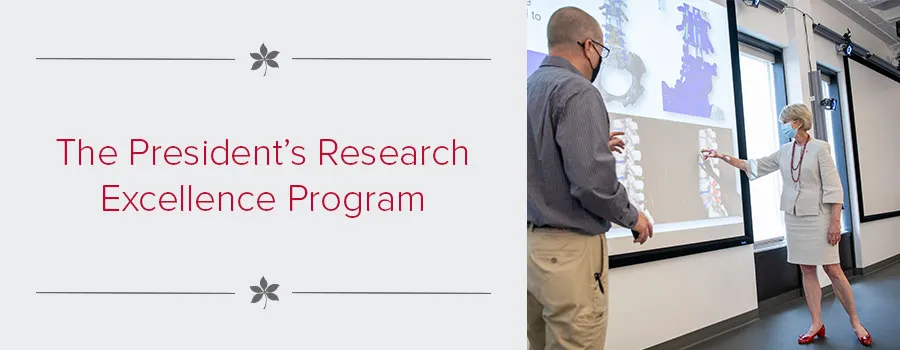
Nearly $1.4 million has been awarded to seven interdisciplinary Ohio State research teams through the President’s Research Excellence (PRE) program. This most recent round of funding focuses on Catalyst proposals – supporting cross- and interdisciplinary teams to pursue large-scale, high-impact research that addresses emerging or existing challenges of national and international societal importance. In addition, these grants of up to $200,000 are intended for research that has the potential to generate long-term, sustained, and significant impact, and positions Ohio State as the leader in the proposed area.
The program supports the university’s goals to help grow its research and innovation enterprise by attracting more externally sponsored research funding, enabling basic and use-inspired research and discoveries, and addressing large, complex societal challenges. Nine of Ohio State’s 15 colleges are represented in these seven proposals showing the interdisciplinary focus of the program, which is administered by the Office of Knowledge Enterprise.
“When we invest in some of our own most promising research as a university, other funders take notice,” said Dorota Grejner-Brzezinska, interim vice president for knowledge enterprise. “Programs like this help further attract partners and funding, accelerating the research so that we can innovate and translate at pace and scale.”
The PRE program also offers Accelerator Grants of up to $50,000 to support small teams pursuing curiosity-driven, novel, high-risk and high-reward research. Nineteen teams were awarded funding though this mechanism earlier this year. Another request for proposals for Accelerator Grants is planned for Spring 2022.
October 2021 Catalyst Grant Recipients
A New Paradigm in Foods for Health at Ohio State: Multi-Omics Integration in the Era of Precision Nutrition
Lead PI: Steven Clinton, College of Medicine
Co-investigators: Devin Peterson, College of Food, Agricultural, and Environmental Sciences; Vicki Wysocki and Matthew Sullivan, College of Arts and Sciences; Martha Belury and Jiangjiang Zhu, College of Education and Human Ecology
Research Topical Area: Food, nutrition, metabolism, behavior and health
Project description: We will use a multi-omic approach with advanced data analytics and machine learning to integrate across the food-nutrition-microbiome-health continuum
Radioisotopically-Substituted Perovskites for Self-Powered Energy Storage and Photonic Applications
Lead PI: Anne Co, College of Arts and Sciences
Co-investigators: Raymond Cao and Praneeth Kandlakunta, College of Engineering; Jose Lorie Lopez, College of Arts and Sciences
Research Topical Area: Renewable energy, smart grid, energy storage
Project description: This team’s proposed betavoltaic batteries are energy generation devices based on harvesting a continuous flow of charge emitted from a radioactive source. These are very long-lived (20-100 years) sources of stable energy, providing reliable power and nearly zero maintenance for a range of applications.
University Collaboration on Overcoming Attitudinal and Situational Barriers to Collaborative Initiatives to Advance Racial Equity: A Confluence of Dispute Process Design, Law & Social Science
Lead PI: Sarah Cole, Moritz College of Law
Co-investigators: Tijs Van Maasakkers, College of Engineering; Teri Murphy and Korie Little Edwards, College of Arts and Sciences; Tom Gregoire, College of Social Work; Carl Smallwood, Moritz College of Law
Research Topical Area: Novel social science research concepts that address societal challenges related to food, water, health, racial equity and inclusion, and national security
Project description: Ohio State joins strengths in dispute system design, social work, peace efforts, sociology and architecture/planning to study, inform and transform the hoped-for success of government-convened racial equity initiatives through evidence-based tools to overcome attitudinal/situational challenges.
Hybrid Autonomous Point-of-Care Manufacturing
Lead PI: David Dean, College of Engineering
Co-investigators: Michael Groeber and Steve Niezgoda, College of Engineering; Stephen Jones, College of Veterinary Medicine; Kelly Kennedy, College of Dentistry; Andrew Glassman, College of Medicine
Research Topical Area: Digitalized and next generation manufacturing
Project description: This proposal seeks to establish a center of excellence at Ohio State in the field of Point of Care Manufacturing. This center would demonstrate real time methods that close the loop between the design and fabrication of personalized medical devices.
Brain Infrared Modulation of Pathways for Aging, Cognition, and movemenT (Brain IMPACT)
Lead PI: Sanjay Krishna, College of Engineering
Co-investigators: Zeynep Saygin, College of Arts and Sciences; Kingh Luan Phan and Kevin Reeves, College of Medicine
Research Topical Area: Aging, healthy aging
Project description: This team’s vision is to develop a non-invasive therapeutic tool that can treat brain disorders including Parkinson’s Disease and Major Depressive Disorder. We will use infrared photobiomodulation to stimulate brain activity and cognitive functions in healthy and aging populations.
Creating quantum bits based on rare-earth ions for quantum networking
Lead PI: Ronald Reano, College of Engineering
Co-investigators: Dan Gauthier, Ezekiel Johnston-Halperin, Roland Kawakami, Gregory Lafyatis and Alexander Sokolov, College of Arts and Sciences
Research Topical Area: Quantum information science and technology, next generation wireless communication
Project description: This comprehensive research effort will create quantum bits based on the integration of erbium into transformative host systems in integrated photonics platforms. Our team brings together interdisciplinary expertise allowing for both fundamental science and technology to be advanced in tandem.
CRANEES - Convergent Research for the Advancement of National Environmental Equity & Security
Lead PI: Mark Weir, College of Public Health
Co-investigators: Karen Patricia Williams, College of Nursing; Kareem Usher, College of Engineering; Jiyoung Lee, College of Public Health; Kara Morgan, College of Food, Agricultural, and Environmental Sciences
Research Topical Area: Food, nutrition, metabolism, behavior and health
Project description: CRANEES will generate the fundamental and applied data to make drinking water quality equity achievable in the United States. Using field data with community-informed sampling plans, we will develop a community-focused decision-making framework, which will be the foundation of a NIEHS P30 proposal in year 2.